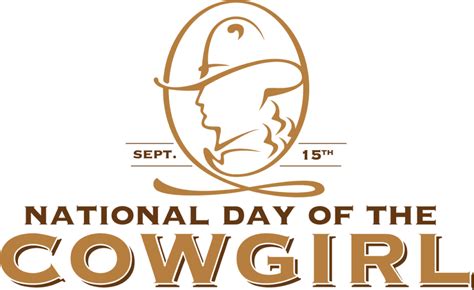Celebrate the Unwavering Strength and Resilience of Cowgirls

Every July 16th, we recognize National Cowgirl Day, a special celebration honoring the extraordinary women who have played a pivotal role in shaping the history and culture of the Wild West. From fearless frontierswomen to trailblazing entertainers, these cowgirls embody the spirit of independence, determination, and adventure.
The Historical Roots of Cowgirls
18th Century:
* Women accompanied westward-bound settlers, providing vital support and expertise in handling livestock and managing camp tasks.
19th Century:
* As the frontier expanded and ranching became a major industry, women took on essential roles in tending cattle, rounding up herds, and operating remote ranches.
* Cowgirls often displayed exceptional equestrian skills and knowledge of cattle behavior.
20th Century:
* Women continued to play a significant role in ranching, particularly in states such as Wyoming, Montana, and Texas.
* Cowgirls also gained recognition for their accomplishments in rodeo events and other Western sports.
Modern Cowgirls: Building on a Legacy
Today, cowgirls continue to honor the traditions and values of their predecessors. They are involved in various aspects of ranching, rodeo, and Western culture:
- Ranching: Cowgirls manage cattle herds, ride horses, and maintain ranch operations in both traditional and modern settings.
- Rodeo: Female rodeo athletes compete in events such as barrel racing, breakaway roping, and goat tying, showcasing their skills and agility.
- Western Culture: Cowgirls promote and preserve Western heritage through organizations like the National Cowgirl Museum and Hall of Fame and participate in events like cowboy poetry gatherings.
Key Characteristics of Cowgirls
- Independence: Cowgirls are known for their self-reliance and ability to handle challenges with determination.
- Hardiness: They are physically strong and capable of demanding work in harsh conditions.
- Equine Expertise: Cowgirls have a deep understanding of horses and a strong bond with their mounts.
- Love of the Western Way of Life: They embody the values of the American frontier, including adventure, freedom, and community.
Celebrating National Cowgirl Day
Events and Activities:
* Attend rodeos featuring women’s events
* Visit museums, historical sites, and ranches that showcase the role of cowgirls
* Participate in cowgirl clinics and workshops to learn about Western skills and horsemanship
* Read books, watch movies, and listen to music about cowgirls
Ways to Support Cowgirls
- Promote women’s involvement in ranching, rodeo, and Western sports
- Recognize and celebrate the accomplishments of cowgirls both past and present
- Support organizations that preserve and advance the legacy of cowgirls
- Educate young people about the contributions of cowgirls to American history and culture
Cowgirls as Role Models for the Modern Age
In an era characterized by rapid change and challenges, cowgirls serve as inspiring role models for both women and girls:
- Empowerment: Cowgirls demonstrate that women can be strong, capable, and successful in traditionally male-dominated fields.
- Resilience: They overcome obstacles and embrace challenges with determination.
- Authenticity: Cowgirls value their connection to the land, animals, and the Western way of life.
- Leadership: They lead by example, inspiring others to embrace their own potential.
Breaking Barriers and Paving the Way
Throughout history, cowgirls have defied gender stereotypes and paved the way for women’s rights and equality:
- Women’s Suffrage: Cowgirls played a role in the movement for women’s right to vote in the early 20th century.
- Property Rights: Cowgirls owned and managed property in some states, challenging traditional gender roles.
- Education: Cowgirls fought for access to education and established boarding schools in the American West.
The Future of Cowgirl Culture
The legacy of cowgirls continues to evolve and inspire future generations. As society progresses, women are finding new ways to embrace the spirit of cowgirls:
Emerging Trends:
- Urban Cowgirls: Women in urban areas are embracing elements of cowboy culture, such as horseback riding and Western fashion.
- Alternative Ranching: Cowgirls are adopting innovative approaches to ranching, including sustainable grazing and land conservation.
- Digital Cowgirlhood: Social media and online platforms are providing new avenues for cowgirls to share their stories and connect with others.
Tables
Table 1: Notable Cowgirls in History
| Name | Occupation | Accomplishments |
|---|---|---|
| Belle Starr | Outlaw | Known for her daring exploits and involvement in the James-Younger Gang |
| Calamity Jane | Scout, entertainer | Served as a scout for the U.S. Army during the Indian Wars |
| Annie Oakley | Sharpshooter | Known for her exceptional shooting skills and role in Buffalo Bill’s Wild West Show |
| Bessie Stringfield | Trailblazer | First woman to drive a cross-country auto race |
| Florence Hughes Randall | Rancher, rodeo athlete | Broke records in women’s rodeo events and managed a successful ranch |
Table 2: Women’s Involvement in Ranching
| Year | Number of Women Ranchers |
|---|---|
| 1978 | 10,000 |
| 1987 | 54,000 |
| 2002 | 122,000 |
| 2012 | 161,000 |
Table 3: Cowgirls in Rodeo
| Event | Number of Female Participants (2021) |
|---|---|
| Barrel Racing | 2,700 |
| Breakaway Roping | 1,800 |
| Goat Tying | 1,200 |
| Team Roping (with Male Partner) | 600 |
Table 4: Key Organizations for Cowgirls
| Organization | Mission |
|---|---|
| National Cowgirl Museum and Hall of Fame | Preserves and celebrates the history and legacy of cowgirls |
| Women’s Professional Rodeo Association | Promotes and supports female rodeo athletes |
| National Cowgirl Hall of Fame | Honors and remembers outstanding cowgirls who have made significant contributions to Western heritage |
| Cowgirls on the Range Association | Connects women from all backgrounds who share a love of ranching and the Western lifestyle |
